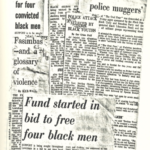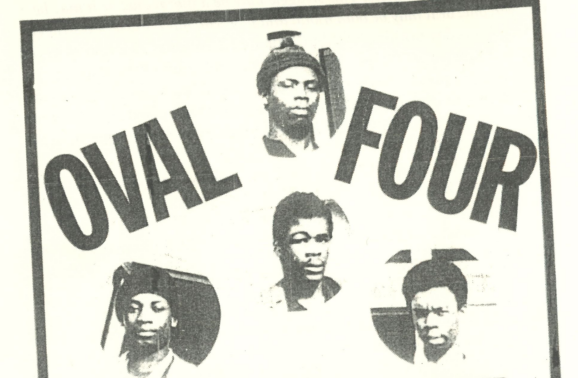Striking evidence has been uncovered about Special Branch’s attempts to infiltrate UK Black Power groups in the late 1960s and early 1970s.
Black Power is in the news this week, with the announcement that the conviction of former Fasimba members Winston Trew and Sterling Christie (two of the ‘Oval Four’) has been referred to the court of appeal. Forty-seven years since they were arrested on their way home from a political meeting in support of another Black Power activist facing trial, and accused of robbery and assaulting the police, they could now finally be cleared. Trew has always believed that the Fasimbas must have been under surveillance by Special Branch and that it was no coincidence that he and the other members of the ‘Oval Four’ were targeted by undercover officers that day.
Trew’s story is just one among many detailed in a recent investigation of Special Branch’s attempts to destroy Britain’s Black Power movement in the late 1960s and early 1970s by Eveline Lubbers of the Undercover Research Group and former IRR staffer Rosie Wild.
 Five articles on Black Power and Special Branch (recently published on The Special Branch Files) are based on a forensic examination of police, Home Office and court records at the National Archives and sealed Special Branch files released via freedom of information requests. Sifting through the many documents in which Special Branch recorded information on Black Power activity, the Undercover Research Group set out the ways in which Britain’s political police sought to destabilise and decapitate the largest Black Power groups in the UK, as well as explaining the historical context of the British Black Power movement.
Five articles on Black Power and Special Branch (recently published on The Special Branch Files) are based on a forensic examination of police, Home Office and court records at the National Archives and sealed Special Branch files released via freedom of information requests. Sifting through the many documents in which Special Branch recorded information on Black Power activity, the Undercover Research Group set out the ways in which Britain’s political police sought to destabilise and decapitate the largest Black Power groups in the UK, as well as explaining the historical context of the British Black Power movement.
One of the most ironic findings is that the racism that stopped the Metropolitan Police hiring a single black police officer before 1967 hamstrung it when it came to infiltrating Black Power groups. Unlike the leading white left-wing organisations of the era, which were often heavily infiltrated by uncover officers using assumed identities, Black Power groups such as the Black Panther Movement and Black Liberation Front could only be spied on from the outside or occasionally through the use of informants.
Special Branch’s orders came from the top with reports on Black Power in the UK being fed back to the UK’s Joint Intelligence Committee and successive Home Secretaries. A dedicated Black Power Desk was even set up to coordinate the intelligence gathering. Tantalisingly mentioned in just a single document, the Desk was either part of Special Branch or MI5, and shows just how seriously the British state took the threat of Black Power.
 The Undercover Research Group is a team of journalists, activists and academics determined to make public as much information as possible about political policing in Britain. Using information being released from the glacially slow UK Undercover Policing Inquiry, as well as independent research, they have created a public database of spycops and their targets. Stretching as far back as 1968, the database includes one Special Demonstration Squad officer, operating under the alias Peter Fredericks, who has admitted being tasked with monitoring Britain’s small but significant Black Power movement.
The Undercover Research Group is a team of journalists, activists and academics determined to make public as much information as possible about political policing in Britain. Using information being released from the glacially slow UK Undercover Policing Inquiry, as well as independent research, they have created a public database of spycops and their targets. Stretching as far back as 1968, the database includes one Special Demonstration Squad officer, operating under the alias Peter Fredericks, who has admitted being tasked with monitoring Britain’s small but significant Black Power movement.
To find out more about the case, read a review by Colin Prescod of Trew’s pathbreaking book, Black for a Cause … Not Just Because … The case of the ‘Oval 4’ and the story it tells of Black Power in 1970s Britain here.

